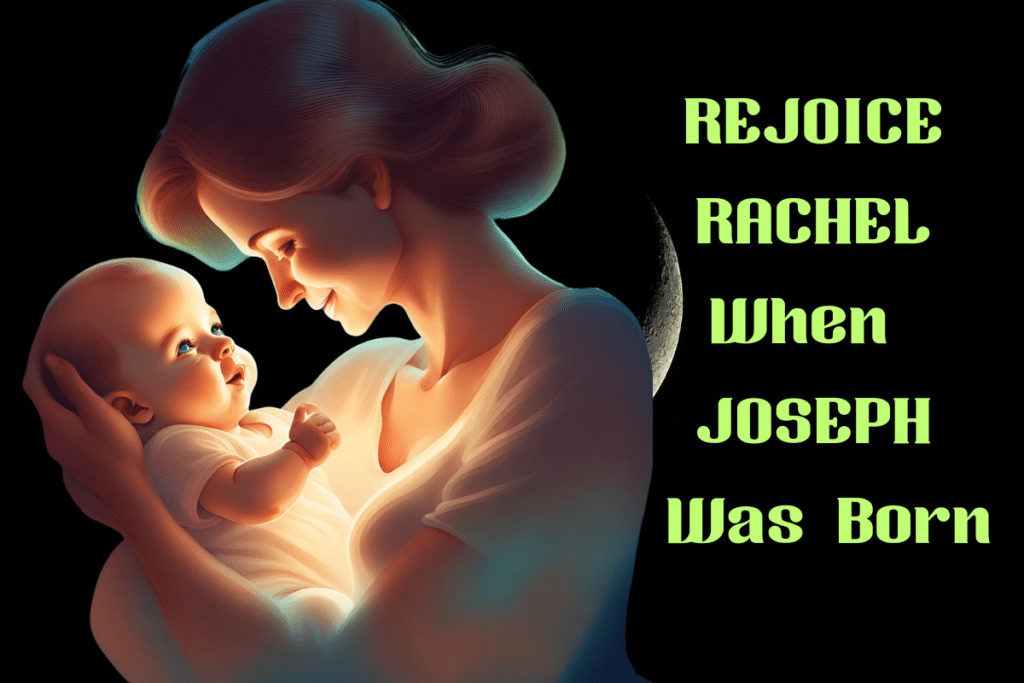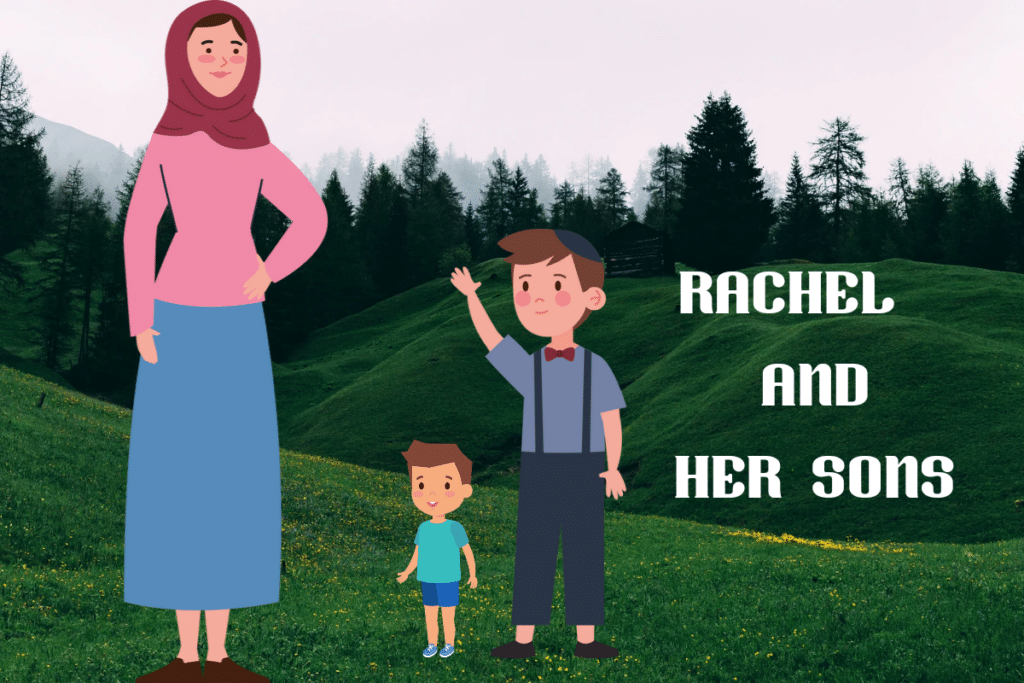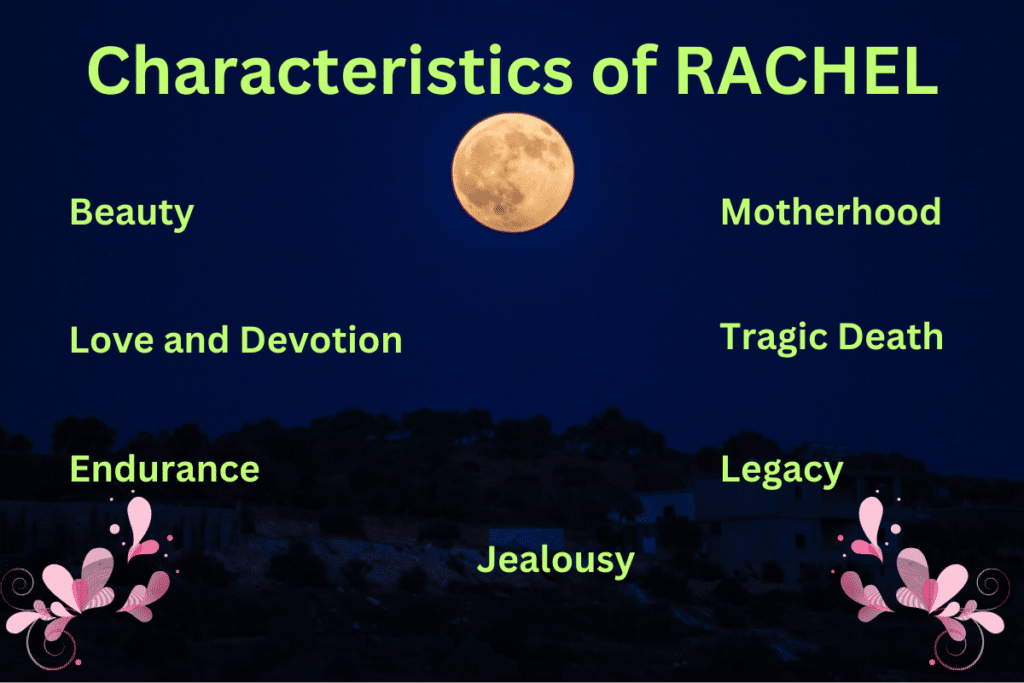REJOICE RACHEL IN THE BIBILE
Rachel in the Bible was the youngest daughter of Laban and the second wife of Jacob, known for her beauty and the mother of Joseph and Benjamin. Her story is one of love, jealousy, and tragedy, marked by struggles with infertility and sibling rivalry with Leah. Despite her challenges, Rachel’s life exemplifies dedication, cunning, and the pursuit of motherhood. Her relationship with Jacob, characterized by deep love and sacrifice, showcases a complex yet compelling narrative that continues to inspire generations with its blend of romance and sorrow.

Rachel in the Bible Background and Family
Rachel in the Bible was the younger daughter of Laban and the younger sister of Leah. Rachel became the wife of Jacob and the mother of Joseph and Benjamin, who together with their brothers, make up the 12 tribes of the House of Israel. Rachel’s father, Laban, was Jacob’s uncle, making Jacob and Rachel cousins. Rachel in the Bible was known for her beauty, which overwhelmed Jacob when he first saw her. She was also a shepherdess and household manager in Haran.
Rachel in the Bible name means “Shepherdess” in the Bible, which is well-fitting for Rachel since she was a shepherdess to her father’s flock of sheep. Rachel had some ups and downs, as we all do in life. Let’s look at some of her more admirable traits, such as her trust in God. Rachel trusted God while she may have had doubts about what God was doing in her life. She always believed in Him.
Rachel in the Bible Marriage to Jacob
Jacob, upon meeting Rachel, falls deeply in love with her and agrees to work for Laban for seven years in exchange for Rachel’s hand in marriage (Genesis 29:18-20). However, Laban deceives Jacob by giving him Leah instead. Jacob then works another seven years to finally marry Rachel (Genesis 29:21-30).
Rachel in the Bible Struggle with Infertility
Rachel in the Bible struggle with infertility is a significant theme in her story in the Bible. Rachel was the younger sister of Leah, and both women were married to Jacob. However, while Leah was able to have children, Rachel was barren, which caused her great distress and led to her jealousy of her sister.
Rachel’s infertility is mentioned in Genesis 29:31, where it says, “When the Lord saw that Leah was hated, he opened her womb, but Rachel was barren.” This verse highlights the fact that Rachel’s infertility was not due to any physical issue, but rather, it was a divine intervention. Rachel’s barrenness was a source of great pain for her, and she even offered her maidservant to Jacob to have children through her, hoping that this would alleviate her pain.
Rachel in the Bible struggle with infertility is a reminder that even those who are loved and cherished, like Rachel, can face significant challenges in their lives. Rachel’s story teaches us that infertility is not a punishment or a sign of unfaithfulness, but rather, it is a complex issue that can affect anyone, regardless of their circumstances.
Moreover, the story of Rachel in the Bible also highlights the societal pressure and expectations that women faced in ancient times regarding childbearing. Rachel’s desperation to have children was not just due to her personal desire, but also due to the social expectation that women should bear children to fulfill their roles as wives and mothers.
Infertility is a common theme in the Bible, and the story of Rachel is one of many examples of how this issue was addressed in ancient times. Rachel’s struggle with infertility is a reminder that even in the face of significant challenges, we can find hope and comfort in God’s word. As the Bible says in Psalm 30:5, “Weeping may endure for a night, but joy cometh in the morning.”

Rachel’s Relationship with Leah
Rachel and Leah, the two sisters in the Bible, had a complex relationship marked by rivalry, jealousy, and yet also kindness and compassion. Rachel, the younger sister, was loved more by their husband Jacob, while Leah, the older sister, was the first to give birth to Jacob’s children. Rachel’s infertility caused her great distress, and she was jealous of Leah’s ability to have children.
Their relationship was not just about their rivalry over Jacob and children, but also about their position in the family and society. In the ancient world, having children was seen as a woman’s primary role, and infertility was often viewed as a curse. Rachel’s barrenness was a source of great pain for her, and she even offered her maidservant to Jacob to have children through her.
Despite their rivalry, there were moments of kindness and compassion between the sisters. Rachel, for instance, revealed the secret signs to Leah before her wedding night, allowing Leah to marry Jacob instead of Rachel. This act of kindness was significant, as Rachel gave up her chance to marry Jacob to prevent her sister’s embarrassment.
Leah, on the other hand, prayed for Rachel to have a child, even though Rachel’s children would be her rivals. This act of compassion and solidarity between the sisters highlights the complexities of their relationship and the challenges they faced as women in a patriarchal society. The Midrashic interpretations of their story also emphasize the importance of familial loyalty and cooperation between the sisters. In one midrash, Rachel and Leah agreed to leave their father’s home to protect their household, showing their commitment to each other and their family.
Rachel and Leah’s relationship was marked by both rivalry and kindness, reflecting the complexities of sibling relationships and the challenges women faced in the ancient world. Despite their differences, they remained united as mothers of the tribes of Israel, and their story serves as a powerful reminder of the importance of compassion, kindness, and solidarity between women.

Rachel’s Sons: Joseph and Benjamin
Rachel in the Bible the wife of Jacob, was the mother of two sons, Joseph and Benjamin. Joseph was born after Rachel had been married to Jacob for seven years, and he was Jacob’s favorite son. Joseph’s story is a significant one in the Bible, as he became a leader of Israel’s tribes between exile and nationhood. He prepared the way in Egypt for his family’s exile there, and his story is told in detail in the Bible.
Benjamin, Rachel’s second son, was born after Rachel had given birth to Joseph. Rachel in the Bible died during Benjamin’s birth, and she named him Ben Oni, which means “son of my mourning.” However, Jacob called him Ben Yamin, which means “son of the right” or “son of my days.
“Rachel’s sons, Joseph and Benjamin, were important figures in the Bible. Joseph’s story is a significant one, as he played a crucial role in the history of Israel. Benjamin, on the other hand, was the youngest son of Jacob and the last link to Rachel. He was highly valued by his father and became one of the 12 tribes of Israel.
Rachel in the Bible was the mother of two sons, Joseph and Benjamin, who were important figures in the Bible. Joseph’s story is a significant one, as he became a leader of Israel’s tribes between exile and nationhood. Benjamin, on the other hand, was the youngest son of Jacob and the last link to Rachel. He was highly valued by his father and became one of the 12 tribes of Israel.

Characteristics of Rachel in the Bible
- Beauty: Described as “beautiful of form and appearance” (Genesis 29:17), Rachel’s physical attractiveness captured the attention of Jacob, who fell deeply in love with her at first sight.
- Love and Devotion: Despite facing challenges and hardships, Rachel’s love and devotion to Jacob remained unwavering. Her willingness to wait for him for seven years and then another seven years, as well as her loyalty to him throughout their marriage, exemplify her deep affection.
- Endurance: Rachel in the Bible endured the pain of infertility for many years, longing for children of her own while witnessing her sister Leah bear multiple sons to Jacob. Despite this emotional turmoil, she remained steadfast in her faith and perseverance.
- Jealousy: Rachel’s relationship with her sister Leah was marked by jealousy and rivalry, especially concerning their shared husband Jacob. Rachel’s longing for children and Leah’s ability to bear sons exacerbated this tension, leading to a complex dynamic within their family.
- Motherhood: Rachel’s eventual joy at becoming a mother to Joseph and Benjamin showcased her maternal instincts and love for her children. Despite the challenges she faced, Rachel embraced motherhood with gratitude and dedication.
- Tragic Death: Rachel’s life ended tragically during childbirth, highlighting the fragility of human existence. Her death near Bethlehem, while giving birth to Benjamin, serves as a poignant reminder of the fleeting nature of life.
- Legacy: Despite her premature death, Rachel’s legacy endured through her sons, particularly Joseph, whose rise to prominence in Egypt played a crucial role in the preservation of their family lineage. Rachel’s influence and significance persisted throughout biblical history and beyond.

Lessons from Rachel in the Bible
- Perseverance in Adversity: Rachel’s enduring struggle with infertility teaches us the importance of perseverance in the face of challenges. Despite her longing for children and the emotional pain she endured, Rachel remained steadfast in her faith and hopeful for the future.
- Faith in God’s Timing: The story of Rachel in the Bible reminds us to trust in God’s timing and plan for our lives. Despite the delays and disappointments she faced, Rachel held onto her faith and believed that God would fulfill His promises in His own time.
- Dealing with Jealousy and Rivalry: Rachel’s relationship with her sister Leah highlights the destructive nature of jealousy and rivalry. Through their story, we learn the importance of overcoming envy and striving for harmony and mutual respect in relationships.
- Gratitude for Blessings: Rachel’s joy at finally becoming a mother to Joseph and Benjamin teaches us the importance of gratitude for the blessings we receive in life. Despite her past struggles, Rachel embraced motherhood with thankfulness and cherished her children deeply.
- Acceptance of Imperfections: Rachel’s imperfections and struggles humanize her character, reminding us that even biblical figures faced trials and shortcomings. Through her story, we learn the importance of accepting our own imperfections and relying on God’s grace for strength.
- Legacy of Love and Sacrifice: Rachel’s legacy of love and sacrifice lives on through her children and their descendants. Her willingness to endure hardship and make sacrifices for the sake of her family inspires us to prioritize love and selflessness in our own lives.
- Hope for the Future: Despite the tragedies she faced, Rachel’s story ends with a message of hope for the future. Her legacy lives on through the generations that follow, serving as a reminder that even in the darkest moments, there is always hope for redemption and renewal.
Impact of Rachel in the Bible Story Today
Impact of Rachel in the Bible story today is profound, resonating through themes of love, jealousy, resilience, and faith. Her narrative serves as a timeless lesson on the complexities of relationships, the longing for motherhood, and the struggles with infertility and sibling rivalry. Rachel’s character embodies beauty, love, and the pursuit of dreams, making her relatable to many individuals facing similar challenges in modern times.
Rachel in the Bible story inspires reflection on dedication, sacrifice, and the enduring power of love amidst trials and tribulations. Furthermore, Rachel’s legacy as a matriarch of the Nation of Israel symbolizes hope, unity, and the spiritual and physical return of the Jewish people.
Her tomb remains a place of pilgrimage and prayer, connecting people worldwide to her story and the values she represents. Rachel’s impact today continues to inspire individuals to confront adversity with courage, seek healing and transformation, and uphold values of faith, resilience, and compassion in the face of life’s challenges.
Conclusion
Rachel in the Bible is a significant figure, known for her beauty and the love story with Jacob, which led to the birth of Joseph and Benjamin. She was the youngest daughter of Laban and the second wife of Jacob, her cousin.
Rachel in the Bible is marked by her struggles with infertility, her desire for children, and her eventual death during the birth of her second son, Benjamin. Her early death has made her an image of tragic womanhood, and her legacy as a mother of two of the twelve tribes of Israel has continued to inspire generations.
Rachel in the Bible is a reminder of the complexities of relationships, the longing for motherhood, and the struggles with infertility. Her impact in the Bible story today continues to inspire individuals to confront adversity with courage, seek healing and transformation, and uphold values of faith, resilience, and compassion in the face of life’s challenges.
REFERENCE
Unique FAQ’s
- Was Rachel the only wife of Jacob?
- No, Rachel was one of Jacob’s wives. He also married her sister Leah and their handmaids, Bilhah and Zilpah.
- What is the significance of Rachel’s infertility in the biblical narrative?
- Rachel’s infertility plays a significant role in shaping her character and relationships, highlighting themes of longing, faith, and divine providence.
- How many sons did Rachel have?
- Rachel gave birth to two sons: Joseph and Benjamin.
- Why is Rachel’s tomb significant?
- Rachel’s tomb, located near Bethlehem, is a site of pilgrimage and prayer for people of various faiths, symbolizing her enduring legacy and spiritual significance.
- What lessons can we learn from Rachel’s life?
- Rachel’s life teaches us about perseverance, faith, and the enduring power of love. Despite facing numerous hardships, she remained steadfast in her devotion to her family and her faith in God.


1 thought on “8. REJOICE RACHEL IN THE BIBLE”